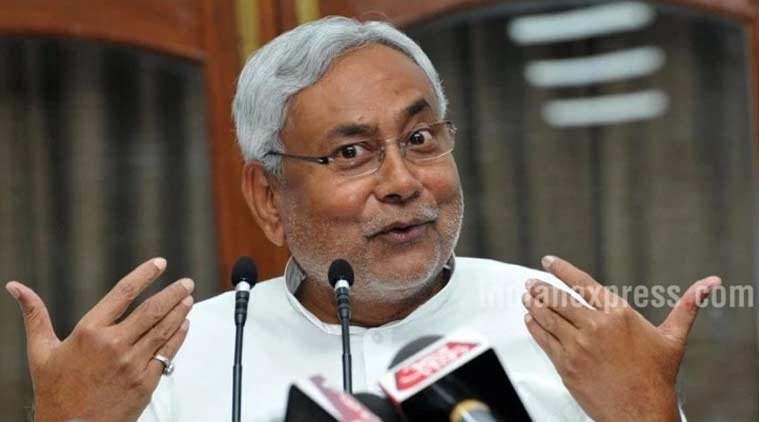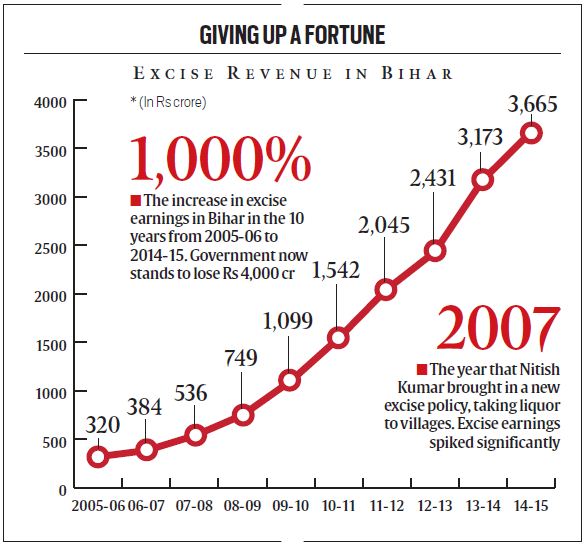The Bihar Excise (Amendment) Act, 2016, that came into force on April 1, gave the 1915 Act sharper legal teeth, and prescribed the death penalty for the manufacturers, suppliers and sellers of hooch in case of death as a result of consumption of spurious liquor. It banned the manufacture, transport, sale and consumption of country liquor in the state — and restricted the sale of non-country or ‘Indian Made Foreign Liquor’ (IMFL) to 655 outlets of the Bihar State Beverages Corporation in towns and municipal corporation/council areas. Ninety of these 655 outlets were in Patna; in all, the state had 5,500 IMFL and country liquor shops.

On April 6, however, the government announced a tightening of the ban, extending it to IMFL immediately. This extension of the ban has made Bihar an entirely dry state, like Gujarat.
[related-post]
How strong are the penal provisions?
Very. The new Act has picked up stringent penal provisions from the excise laws of several states. The toughest is the death-for-death provision in case of a hooch tragedy; if a person is left with handicaps after drinking spurious liquor, the offender could get between 10 years and life in prison. The punishment for illegal trade and transport of liquor, selling or serving industrial liquor to consumers, and selling IMFL as desi liquor brand or vice versa is 7-10 years’ jail and fine up to Rs 10 lakh. Drinking in public places will attract 5-10 years in jail and fine up to Rs 10 lakh; even drinking at home and creating a nuisance is punishable by a jail term of 10 years to life. Neighbours can complain to police or at a toll-free number, and offenders will be booked under the new Act along with IPC sections.

There are separate provisions in the Act to protect women and children. The Act lays down a compensation of Rs 4 lakh in case of death due to consumption of spurious liquor, and financial help of Rs 20,000 for the treatment of medical complications.
The Act also empowers district magistrates to impose a collective fine on a village or locality that shows a trend of frequently violating the new excise law. The DM can determine the fine on the basis of the seriousness of violations.
Why was the ban extended within days of the Act coming into force?
Story continues below this ad
On April 6, Chief Minister Nitish Kumar changed the timeline of gradual implementation of the ban to immediate enforcement, and extended it to IMFL as well, saying the government had been “overwhelmed by the people’s response to the ban on country liquor”, and that “an ambience had been created that supported a complete ban on any kind of liquor”. All stocks of all liquor, including the liquor that people may have at home, must be immediately destroyed, he said.
The tightening and extension of the ban came amid apprehensions that the amended law, which placed enormous power in the hands of the police, district collector, excise department and other officials, could be misused. Districts bordering Jharkhand, Uttar Pradesh, West Bengal and Nepal were seen as being especially vulnerable to corruption and widespread harassment of people. On April 6, Nitish warned liquor shops in neighbouring states against hoping for a spike in sales as a result of the Bihar ban. “We have put in place a system of digital locks for liquor containers travelling through Bihar. Such locks can be opened only after (these) vehicles cross Bihar. We have already spoken to neighbouring states’ police chiefs,” he said.
Technically, Biharis can drink outside Bihar’s boundaries, but the Act will be applicable to them if they create a nuisance upon returning.
Are there no exemptions to the liquor ban?
The only exemptions are available to addicts, who can get liquor against a doctor’s prescription, and Army cantonments, the chief minister said. Toddy — the fermented extract of the sugar palm, an intoxicant that is consumed widely in the villages and by large numbers of the urban poor — is exempt as well, but it can be sold only with some restrictions. An April 1991 notification of the excise department says toddy cannot be sold within 50 metres of public places — schools, colleges, or any other educational institution; hospitals; railway stations and bus stops; at the entrance to markets; on national or state highways; and at any place of public gathering — in urban areas, and 100 metres of public places in rural areas. But if toddy is mixed with other substances and causes as much damage as spurious liquor, provisions of the tough new law will apply to offenders.
Is there a political calculation behind enforcing the ban?
Story continues below this ad
It is ironical that the liquor ban has been brought by Nitish Kumar, who had, in 2007, sought to increase revenues through a new excise policy that took liquor to villages. At nearly Rs 4,000 crore, excise is a major source of funds for the cash-starved government. But Nitish, who meticulously created a caste-neutral constituency of women with his masterstroke of 50 per cent reservation in panchayats in 2006, decided to follow up with acceding to their persistent demands for a ban on liquor. The issue has huge resonance among women voters — and in July 2015, Nitish, who was up against Narendra Modi’s popularity, promised them he would ban liquor if he returned to power. Days after becoming Chief Minister again, Nitish kept his promise — announcing, on November 26, 2015, the ban from April 1, 2016.

 Bihar Chief Minister Nitish Kumar.
Bihar Chief Minister Nitish Kumar.






































